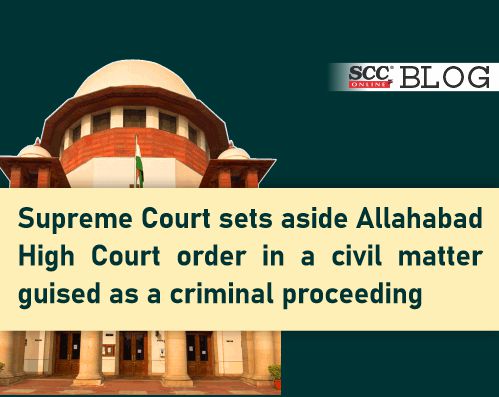Supreme Court: The division bench of Sanjiv Khanna and J.K. Maheshwari, JJ., set aside the order of the Allahabad High Court which had dismissed the petition under Section 482 of the Code of Criminal Procedure, 1973, challenging the summoning order and non-bailable warrant passed by the Additional Chief Judicial Magistrate, Ghaziabad against Jotun India Pvt. Ltd. (‘JIPL’), regional sales manager and sales and marketing director (‘petitioners’) and had held that
“On the basis of evidence available on records and on the basis of statement of Complainant, the charge is appearing prima facie regarding showing forged demand against the Complainant, therefore the Opponents Manager Jotun India Pvt. Ltd. through Chief Manager Jotun India Pvt. ltd. Andheri East, Mumbai is liable to (be) summoned for trial in section 406 I.P.C. for trial prima facie.”
The complaint filed by the complainant accepted the factum of commercial relationship between the parties. It was alleged that JIPL were not issuing bills on time despite reminders but would insist upon payment of money. It was further alleged that forged bill were raised despite not ordering any goods. More so, the allegation was such that respondent no.2 /complainant was falsely billed to the extent of Rs. 2,00,00/-. The complainant had invoked Sections 405, 420, 471, and 120-B of the Penal Code, 1860 (‘IPC’). However, summons were directed to be issued only under Section 406 of the IPC.
Issue
Whether the allegations made in the complaint attract the penal provisions under the relevant sections of IPC?
Court Analysis
The Court noted that the materials on record failed to satisfy the ingredients of Section 405 of the IPC. The complaint did not directly state how and in what manner, on facts, the requirements were satisfied. Therefore, making the summoning order quiet and albeit.
The Court further held that a mere wrong demand or claim would not meet the conditions specified by Section 405 of the IPC in the absence of evidence to establish entrustment, dishonest misappropriation, conversion, etc. Hence, even if respondent no. 2 – complainant is of the opinion that the monetary demand or claim is incorrect and not payable, given the failure to prove the requirements of Section 405 and 406 of the IPC, an offence under the same section is not constituted.
Moreover, the Court stated that the ingredients to constitute an offence under Section 420 read with Section 415 of the IPC were absent. There was no assertion, much less legal evidence, to submit that JIPL had engaged in dishonesty.
The Court further negated the existence of Section 471 of IPC, since the said Section is only applicable when a person fraudulently or dishonestly uses any document or electronic record as a genuine document, which he knows or has reasons to believe to be a forged document.
The Court noted that the allegations made by the complainant about few bills being forged were in reference to 2013 balance whose complaint was made after four years of the bill being claimed which did not reflect criminal intent.
The Court while referring to the pre-summoning evidence and the assertions made in the criminal complaint noted that the dispute raised by the complainant primality pertained to settlement of account. The material on record did not reflect and indicate that JIPL indeed had the dishonest/culpable intention for the commission of the alleged offences under the IPC. However, the complaint disclosed a civil dispute and grievance relating to the claim made by JIPL
While concluding the judgment, the Court referred to Thermax Limited and Others v. K.M. Johny, (2011) 13 SCC 412 which held that the court should be watchful of the difference between civil and criminal wrongs, though there can be situations where the allegations may constitute both civil and criminal wrongs. The court must cautiously examine the facts to ascertain whether they only constitute a civil wrong, as the ingredients of criminal wrong are missing.
The Court went on to opine that the assertions made in the complaint and the pre-summoning evidence led by the complainant failed to establish the conditions and incidence of the penal liability, as the allegations pertain to alleged breach of contractual obligations. The Court expressed its displeasure by the attempts made by parties to invoke jurisdiction of criminal courts, by filing vexatious criminal complaints by camouflaging allegations which were ex facie outrageous or pure civil claims.
“Only upon being satisfied that there is sufficient ground for summoning the accused to stand the trial, summons should be issued. Summoning order is to be passed when the complainant discloses the offence, and when there is material that supports and constitutes essential ingredients of the offence.” observed the Supreme Court.
The Court further observed that the Allahabad High Court, while dismissing the petition filed under Section 482 of the Code, failed to take due notice that criminal proceedings should not be allowed to be initiated when it is manifest that these proceedings have been initiated with ulterior motive of wreaking vengeance and with a view to spite the opposite side due to private or personal grudge.
Thus, the Court set aside the order of the Allahabad High Court, summoning order and the non-bailable warrant passed by the Additional Chief Judicial Magistrate, Ghaziabad, Uttar Pradesh.
[Deepak Gaba v. State of Uttar Pradesh, 2023 SCC OnLine SC 3, decided on 02-01-2023]
*Judgment by Justice Sanjiv Khanna.
Advocates who appeared in this case:
For the Appellant- Advocate Syed Jafar Alam;
For the Respondent- Advocate Sarvesh Singh Baghel;
Advocate Mayuri Raghuvanshi.







